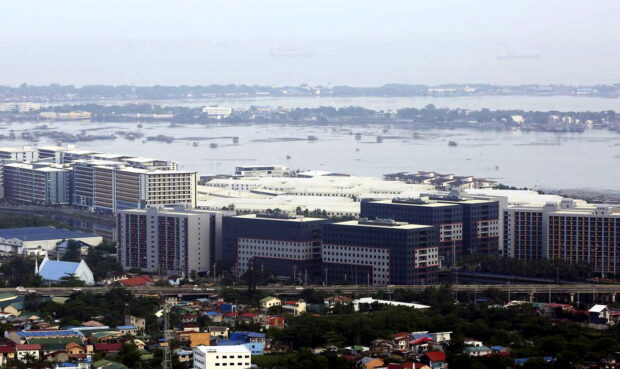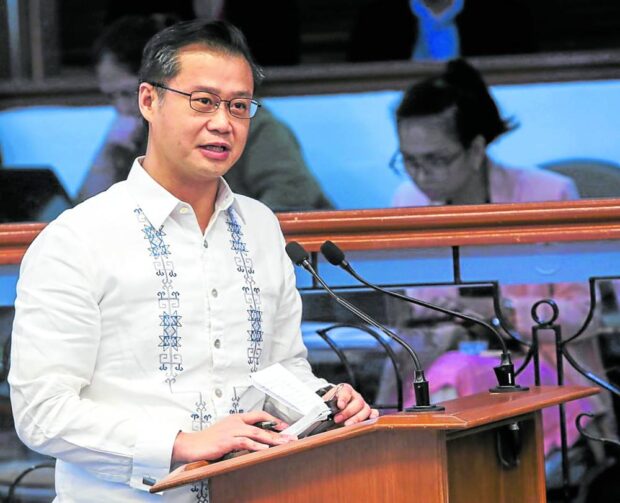Gatchalian sees Marcos pulling plug on POGOs

‘GOOD BUSINESS’ | The POGO Island in Kawit, Cavite province. (Photo by NIÑO JESUS ORBETA / Philippine Daily Inquirer)
MANILA, Philippines — Sen. Sherwin Gatchalian on Sunday expressed confidence that President Ferdinand Marcos Jr. would support his recommendation to ban Chinese-run online gaming establishments that had been blamed for the rise in kidnappings and other crimes in the country.
According to the senator, it wouldn’t make sense for the President to support the continued presence of Philippine offshore gaming operators (POGOs) when his own economic team wanted them shut down.
The chair of the Senate ways and means committee, who led the investigation into the impact of POGOs on the country’s economy, said he would furnish Marcos an advance copy of the panel’s report, which the Senate has yet to discuss in plenary.
“I’m confident that the president will be supportive of our recommendation,” Gatchalian told dzBB radio.
He noted that the Department of Finance (DOF) and the National Economic and Development Authority (Neda) had both expressed their opposition to POGOs, which thrived during the administration of Rodrigo Duterte, Marcos’ predecessor.
Article continues after this advertisement‘Peace of mind’
“First of all, the economic managers are saying that [POGOs] are not good for the country’s image. And we will not have peace of mind while they are still here,” he said.
Article continues after this advertisement“The fear of Filipinos getting kidnapped will linger while they are still operating… We should not clutch at the knife’s edge because there are other businesses that will not affect our country’s peace and order,” he added.
Last week, Gatchalian opted to deliver a “chairman’s report” on the Senate floor as the majority of the 18 panel members had not yet signed the committee report.
As of Friday, only seven senators had signed the committee report with its recommendation for a total POGO ban.
Gatchalian said he was expecting more of his colleagues to back the report since he had sent them all the documentary evidence showing that Pogos had brought the country more harm than good.
Annual losses
The senator said that, based on estimates of the DOF and Neda, the country would be losing more than P8 billion a year in tourism revenues and investment opportunities.
“We are the only country in the world hosting Pogos… If this is really a good business, then all countries should be fighting to entice them,” Gatchalian said.
In September 2022, Senate President Juan Miguel Zubiri said he would support a move by other senators to ban Pogos, following reports of serious crimes, including killings and abductions, that had victimized POGO workers from China.
Pogos first emerged in the country in 2016, the first year of Duterte’s presidency, as he pursued closer ties with China.
Operators capitalized on the country’s liberal gaming laws to target customers in China, where gambling is banned.
But along with the rise of POGOs came reports of kidnappings, blackmail, prostitution, and other crimes involving or victimizing Chinese workers in the industry.
Many Filipinos also complained about POGOs driving up property rates as well as incidents of racism.
Small revenues
Other critics noted that Chinese President Xi Jinping himself had requested the Philippines in 2019 to ban online gambling establishments catering to Chinese nationals.
Zubiri said he was having doubts about whether the small revenues from POGOs were worth it.
From P7.18 billion in 2020, the taxes collected from the POGO industry by the Bureau of Internal Revenue dropped by 46 percent to P3.91 billion in 2021.
The much higher projected income this year is P32 billion, but only P3 billion has been collected to date, according to Finance Secretary Benjamin Diokno. Chinese-Filipino group Movement for Restoration of Peace and Order (MRPO), whose members or kin had fallen prey to kidnappers, expressed support for a ban on Pogos, amid a series of reported crimes in which their employees, mostly Chinese nationals, had been implicated.
‘Bad image’
Teresita Ang See, MRPO’s founding chair and lead convener, said some legal POGO companies had told her that they were “also suffering because of the bad image given to them.”
For every legal POGO company, she estimated that there were “six to seven” illegal sub-licensees, through which Chinese nationals were subjected to human trafficking.
Data from the Philippine Amusement Gaming Corp. (Pagcor) in September 2022 showed that there are 32 POGOs and 127 service providers allowed to operate in the country.
According to the PNP, a total of 20 POGO-related kidnappings were recorded in that month alone, surpassing the 12 reported abductions for the whole of 2021.
Pagcor said online gaming began in 2003, but it started to regulate gaming hubs only in 2016.
